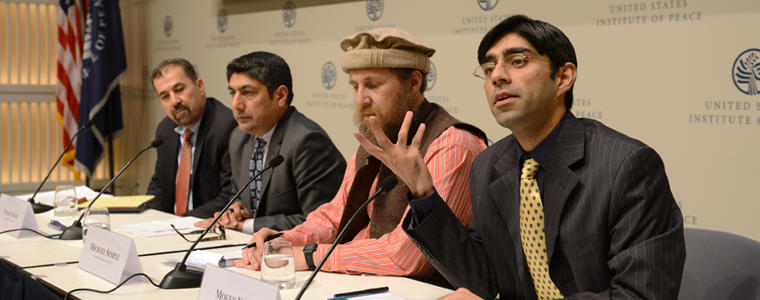Political and Economic Transition Challenges in Afghanistan
In the aftermath of the summit meeting between presidents Obama and Karzai on January 11th, many questions still remain regarding the upcoming security, political and economic transitions in Afghanistan, and the impact these various transitions will have on future peace and stability in Afghanistan. On January 25th, USIP hosted a two-panel event with leading experts on Afghanistan and Pakistan to discuss some of the major challenges and opportunities for peace and political stability in Afghanistan.

In the aftermath of the summit meeting between presidents Obama and Karzai on January 11th, many questions still remain regarding the upcoming security, political and economic transitions in Afghanistan, and the impact these various transitions will have on future peace and stability in Afghanistan. On January 25th, USIP hosted a two-panel event with leading experts on Afghanistan and Pakistan to discuss some of the major challenges and opportunities for peace and political stability in Afghanistan. The two panels are as follows:
Panel One: Getting to Maybe: Updates on the Reconciliation Process
One of the clear agreements from the January 11 summit between Presidents Karzai and Obama was the agreement to open an office in Doha, Qatar, to host talks with Taliban representatives. This is not the only development on the reconciliation front since USIP last hosted a panel on the topic in December. Pakistan has released several Taliban members from prison in what has been interpreted as a gesture of good-will towards the process, the Afghan High Peace Council prepared a “road map” for negotiations that was leaked to the press, and a meeting between representatives of the government, the opposition, and the Taliban took place recently at Chantilly, near Paris. Panelists analyzed these and other developments on the reconciliation front, and discussed to what extent they are genuine indications that reconciliation efforts to promote a politically negotiated end to the conflict in Afghanistan are gaining momentum.
Panelists:
- Omar Samad, President, Silk Road Consulting; Former Afghan Diplomat
- Michael Semple, Carr Center Fellow, Harvard Kennedy School; Former Deputy to the EU Special Representative to Afghanistan
- Moeed Yusuf, Senior Pakistan Expert, United States Institute of Peace
- Moderated by: Andrew Wilder, Director of Afghanistan and Pakistan Programs, United States Institute of Peace
Panel Two: The Money Angle: The Political Economy of Transition
The security, political and economic transitions in Afghanistan will have a major impact on the political economy of Afghanistan, yet to date there has been little analysis focusing on understanding what precisely this impact will be. This panel will apply a political economy approach to assessing the impact of the transitions in Afghanistan, including how changing money and resource flows could incentivize certain behaviors and dis-incentivize others, what the future bases for wealth and power will be, what role the illicit economy will play in politics, and how perceptions of the economic effects of transition will influence political and economic decision-making during the next two years.
Panelists:
- Matthieu Aikins, magazine writer based in Kabul
- Borany Penh, Senior Economic Advisor, USAID Office of Afghanistan and Pakistan Affairs
- Anand Gopal, Bernard L. Schwartz Fellow, New America Foundation
- Moderated by: Bill Byrd, Senior Afghanistan Expert, United States Institute of Peace
Explore Further:
1:00-1:10pm - Welcoming Remarks
1:10-2:40pm - Getting to Maybe: Updates on the Reconciliation Process
2:40-3:00pm - Coffee Break
3:00-4:30pm - The Money Angle: The Political Economy of Transition



